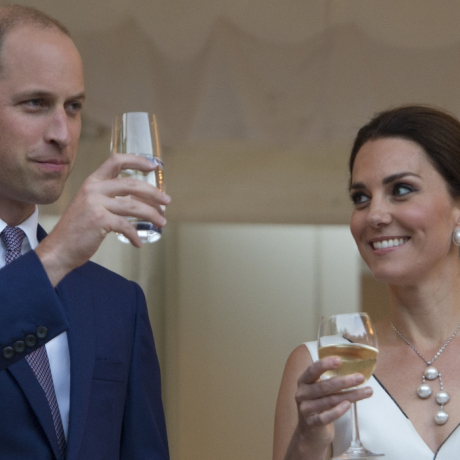The Duke of Cambridge's speech at The Queen's Birthday Garden Party in Poland
Published

Catherine and I are delighted to be embarking on our first visit to Poland, and we hope to return many times in the years to come
Mr. President, Minister, Ambassador,
Panie i Panowie Dobry Wieczor
Good evening to you all – and thank you for joining Catherine and me at this very special occasion.
Tonight we have double reason to celebrate: we mark the birthday of my grandmother The Queen, and we celebrate the depth and breadth of the shared ties of our two great countries.
The links between Britain and Poland go back centuries, and are steeped in a rich history of cultural exchange and close commercial relations. The Shakespeare Theatre in Gdansk, which Catherine and I will see tomorrow, is a reminder that cultural links have long been at the heart of our close relationship.
Shakespeare's plays were performed in Poland – and indeed in Polish – very soon after they were first staged in London.
Around the same time, grain merchants from Poland were plying their trade into Britain, pathfinders for the many entrepreneurs and skilled workers who make the same journey in both directions today.
We in the United Kingdom value our links with Poland enormously. We admire Poland as a remarkable example of courage, fortitude and resilience. You have survived centuries of assaults on your land, including partitions that were designed to wipe you off the map of Europe.
In the 20th century, Poland displayed incredible bravery in resisting brutal Nazi occupation, not least the heroic uprising in Warsaw's Jewish ghetto in 1943, and the Warsaw Rising of 1944.
Catherine and I were very moved to visit the Warsaw Rising Museum this afternoon with President and Mrs Duda; as I know we will be, too, when we visit Stutthof concentration camp tomorrow, a reminder of the suffering of Poland's people and of the Holocaust.
After the Second World War, Poland endured the imposition of Communist dictatorship. But in 1989, in the culmination of a great national renaissance spearheaded by Solidarity, Poland threw off the authoritarian shackles and again took its place as one of the leading nations of Europe. It has been an astonishing achievement – and testament to the Polish character and courage.
There is much to celebrate about the warmth of our relationship today. We are partners in NATO and, for the first time since the Second World War, British troops are stationed in Poland. Some of them, I am pleased to say, are with us here tonight.
And Polish is now the second most spoken language in the United Kingdom, with a generation of young people growing up who feel both British and Polish. Such links – diplomatic, military, cultural – offer much promise and opportunity for the future.
Catherine and I are delighted to be embarking on our first visit to Poland, and we hope to return many times in the years to come. Mr. President and Mrs. Duda, thank you for your hospitality, and thank you to everyone for the warm welcome you have given us, which underlines the strength of the relationship between our two peoples.
If I may, I would like to conclude by reading a short message which my grandmother The Queen asked me to give to you tonight from her:
'Prince Philip and I send our warmest good wishes to all of you attending this special Garden Party on the occasion of The Duke and Duchess of Cambridge's first official visit to Poland.
'We have fond memories of our visit to Poland in 1996, when we experienced its world-renowned hospitality in Warsaw and Krakow. I am delighted that The Duke and Duchess of Cambridge will be able to experience this for themselves in Warsaw and Gdansk.
'In 1996, I spoke about the depth of British-Polish relations, dating back nearly a thousand years, and it gives me great pleasure that the friendship between our two nations and peoples has since gone from strength to strength. I have no doubt it will continue to prosper in the years to come.
'I hope you have a most enjoyable and memorable evening.
'Dziękujemy i miłego wieczoru'


